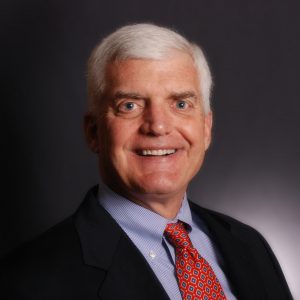Lawrence resident and new Regent says universities can’t cut their way to greatness, Kansas must invest in learning

Wint Winter Jr.
It may be no surprise that the newest member of the Kansas Board of Regents — coming from the state’s largest university community — doesn’t think the state’s university system needs to get any smaller.
Wint Winter Jr., a longtime Lawrence resident, banker and attorney, is set to begin his first duties with the Board of Regents on Friday as he participates in a meeting reviewing the search committee for the open president’s position at Kansas State University.
Winter, who was appointed by Gov. Laura Kelly in June, said he didn’t yet know many of the answers nor all of the questions facing the state’s higher education system, but did come to the position with a firmly held belief.
“Philosophically, I’m a big believer you can’t cut your way to greatness,” Winter said. “We have to find ways to grow and attract students and the vibrancy and the funding that come with that.”
Winter said when the governor’s office approached him about serving as a Regent, he said he wasn’t interested if the role merely involved being a caretaker.
“If there was no chance to ask hard questions and shake up the system, I didn’t want the job,” Winter said. “I was assured that wasn’t the case. I think we all know now is the right time to ask the tough questions and make the tough decisions.”
Winter, though, said one big issue he didn’t expect to tackle during his tenure was the reduction of campuses in the state. The Regents are responsible for overseeing six state universities and 19 community colleges.
“Some people say that is too many and we have to find ways to consolidate,” Winter said. “I’m just the opposite. I think having that many campuses across the state is a real positive. The economy we are entering is a learning economy. There’s no doubt about that. If anyone doubts that, look at the states that are growing. They have invested in learning.”
Having broad choice in university styles, types and locations may end up being a competitive advantage as Kansas tries to recruit more out-of-state students, Winter said.
“The network of campuses we have is a very big positive; however, we have to learn how to cooperate and coordinate better,” Winter said.
While he’s not looking to shrink the size of the state’s higher education system, Winter said there likely will need to be cuts and adjustments to the operations of individual schools. He said growing enrollment would be “the No. 1 job,” and that would require a review of programs that have growth potential, as well as those that don’t.
Programs that don’t have growth potential may need to be eliminated, and the state may want to look at whether universities need all the buildings they currently have or may be planning to build.
“I absolutely think we have to prioritize people over structures,” Winter said.
Winter brings a financial background to the position. His family was the longtime owner of Peoples Bank, which was headquartered in Lawrence but had locations in Colorado and New Mexico, and was doing about $1 billion a year in mortgage loans when it was sold to Bank Midwest in 2017. Winter served as Peoples’ chairman and CEO.
He also brings political experience to the position. For 10 years, from 1982 to 1992, he served as a Republican state senator representing Lawrence. At the Statehouse he was part of the powerful Ways and Means Committee that divided up much of the state funding pie.
Winter said he understood the difficulty higher education has had in securing additional state funding from the Kansas Legislature. But he said Regents should not give up on trying to convince state legislators about the need for greater taxpayer support.
“We have to make the case that we deserve more in resources from the public,” Winter said. “Tuition in Kansas is quite high relative to other Big 12 schools and area states.”
It wasn’t immediately clear when the last time a Lawrence resident served on the Kansas Board of Regents was, but it has been a relatively rare occurrence during the last few decades. Winter said living in a university community and understanding its economy and culture would be useful in the job, but he said he’d push back on any perceptions that he’s looking to put KU ahead of other universities.
He noted that while his family has a long line of KU degree holders, his wife’s family has a long line of K-State degree holders.
“To be effective, one can’t just be a selfish advocate for a parochial interest,” Winter said. “I won’t be. I will be an advocate for the entire system. I know you can’t just walk in wearing a crimson and blue sweater.”







